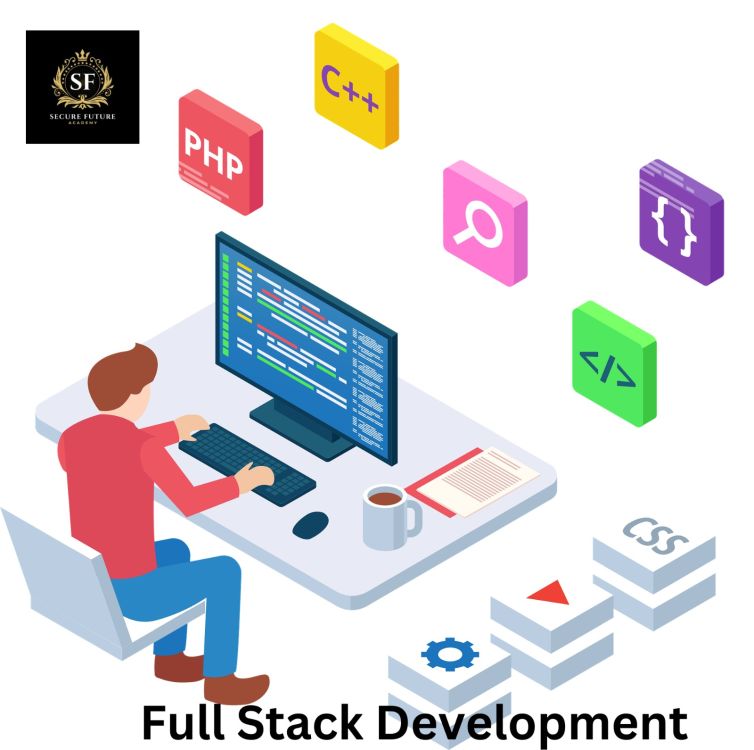
Creating a full-stack development course involves covering both front-end and back-end technologies, along with integrating them to build complete applications. Here’s a comprehensive outline for a full-stack development course:
---
## **1. Introduction to Full-Stack Development**
- **Overview of Full-Stack Development**
- What is full-stack development?
- Key roles and responsibilities
- Technologies involved (front-end, back-end, databases)
---
## **2. Front-End Development**
### **HTML & CSS**
- **HTML Fundamentals**
- Document structure (head, body)
- Basic HTML tags (headings, paragraphs, links, images)
- **CSS Basics**
- Selectors, properties, and values
- Box model (margins, borders, padding, content)
- **Responsive Design**
- Media queries
- Flexbox and CSS Grid for layout
- Mobile-first design principles
### **JavaScript Basics**
- **Introduction to JavaScript**
- Syntax, variables, and data types
- Functions, control structures (loops, conditionals)
- **DOM Manipulation**
- Selecting and modifying elements
- Handling events (clicks, form submissions)
### **Advanced JavaScript**
- **ES6+ Features**
- let/const, arrow functions, template literals
- Destructuring, spread/rest operators
- **Asynchronous JavaScript**
- Callbacks, Promises, async/await
- Fetch API for making HTTP requests
### **Front-End Frameworks**
- **Introduction to React**
- Components, props, and state
- Lifecycle methods and hooks
- JSX and virtual DOM
- **Other Frameworks (Optional)**
- Overview of Vue.js or Angular
- Comparison with React
---
## **3. Back-End Development**
### **Server-Side Languages and Frameworks**
- **Node.js and Express.js**
- Setting up a Node.js environment
- Building RESTful APIs with Express
- Middleware, routing, and error handling
- **Alternative Back-End Languages (Optional)**
- Overview of PHP, Python (Django/Flask), Ruby (Rails)
### **Databases**
- **SQL Databases**
- Introduction to SQL (MySQL, PostgreSQL)
- Database design, CRUD operations
- Writing complex queries (joins, subqueries)
- **NoSQL Databases**
- Introduction to MongoDB
- Document-based storage, querying, and indexing
### **Authentication and Authorization**
- **User Authentication**
- Implementing user login and registration
- Session management using JWT (JSON Web Tokens)
- **Authorization**
- Role-based access control (RBAC)
- Protecting routes and resources
---
## **4. Full-Stack Integration**
### **API Integration**
- **Connecting Front-End with Back-End**
- Making API requests from the front-end
- Handling API responses and errors
- **State Management**
- Managing application state (e.g., Redux for React)
- Local state vs. global state
### **Data Flow and Management**
- **Form Handling**
- Validating and submitting forms
- Managing form state and validation
- **Real-Time Data**
- Implementing WebSockets for real-time communication (optional)
---
## **5. Deployment and DevOps**
### **Version Control**
- **Git Basics**
- Understanding repositories, commits, branches
- Common Git commands (clone, add, commit, push, pull)
- **Collaborative Workflows**
- Using GitHub or GitLab
- Managing pull requests and code reviews
### **Deployment**
- **Hosting**
- Overview of hosting options (shared, VPS, cloud)
- Domain registration and DNS
- **Deployment Techniques**
- Deploying applications using platforms like Heroku, Vercel, Netlify
- CI/CD pipelines and automation
### **DevOps Basics**
- **Monitoring and Performance**
- Tools for monitoring application performance
- Optimizing application performance
---
## **6. Testing and Debugging**
### **Testing Strategies**
- **Front-End Testing**
- Unit tests with Jest or Mocha
- End-to-end testing with tools like Cypress
- **Back-End Testing**
- Unit tests for server-side code
- Integration tests for APIs
### **Debugging Techniques**
- **Front-End Debugging**
- Using browser developer tools
- Common front-end issues and solutions
- **Back-End Debugging**
- Server-side debugging techniques
- Log management and error tracking
---
## **7. Project Management and Collaboration**
### **Agile Methodologies**
- **Agile Principles**
- Understanding Scrum or Kanban
- Managing tasks, sprints, and backlogs
### **Building a Portfolio**
- **Creating a Portfolio Website**
- Showcasing completed projects
- Writing case studies and project descriptions
---
## **8. Final Project**
- **Project Development**
- Designing and developing a complete full-stack application
- Integrating front-end, back-end, and database components
- **Presentation and Review**
- Demonstrating the project
- Receiving and incorporating feedback
---
## **9. Career Development**
### **Job Search Strategies**
- **Resume and Cover Letter**
- Crafting a technical resume and cover letter
- Preparing for technical interviews
- **Networking and Professional Growth**
- Building a professional network
- Engaging with the tech community
---
Qualification : 10th / 12th / Graduated .etc